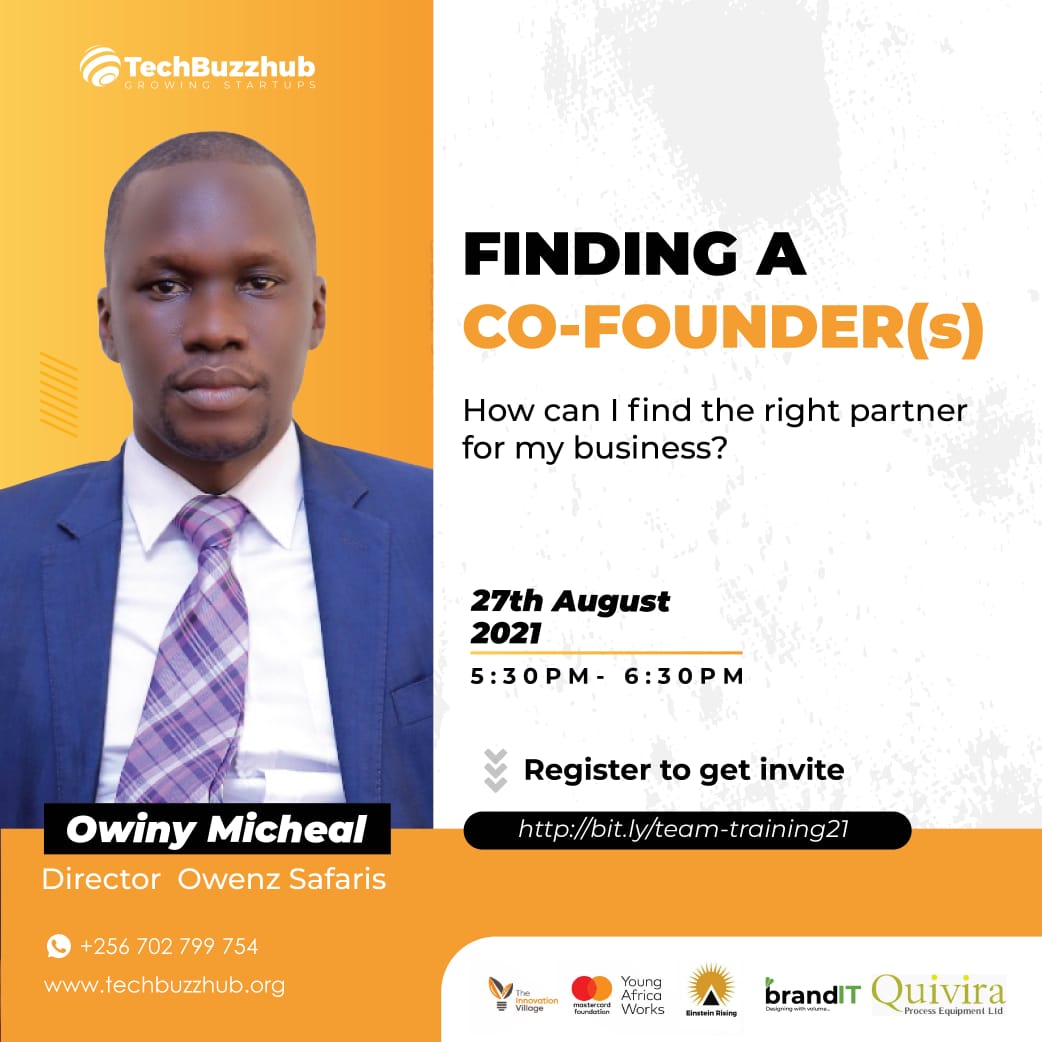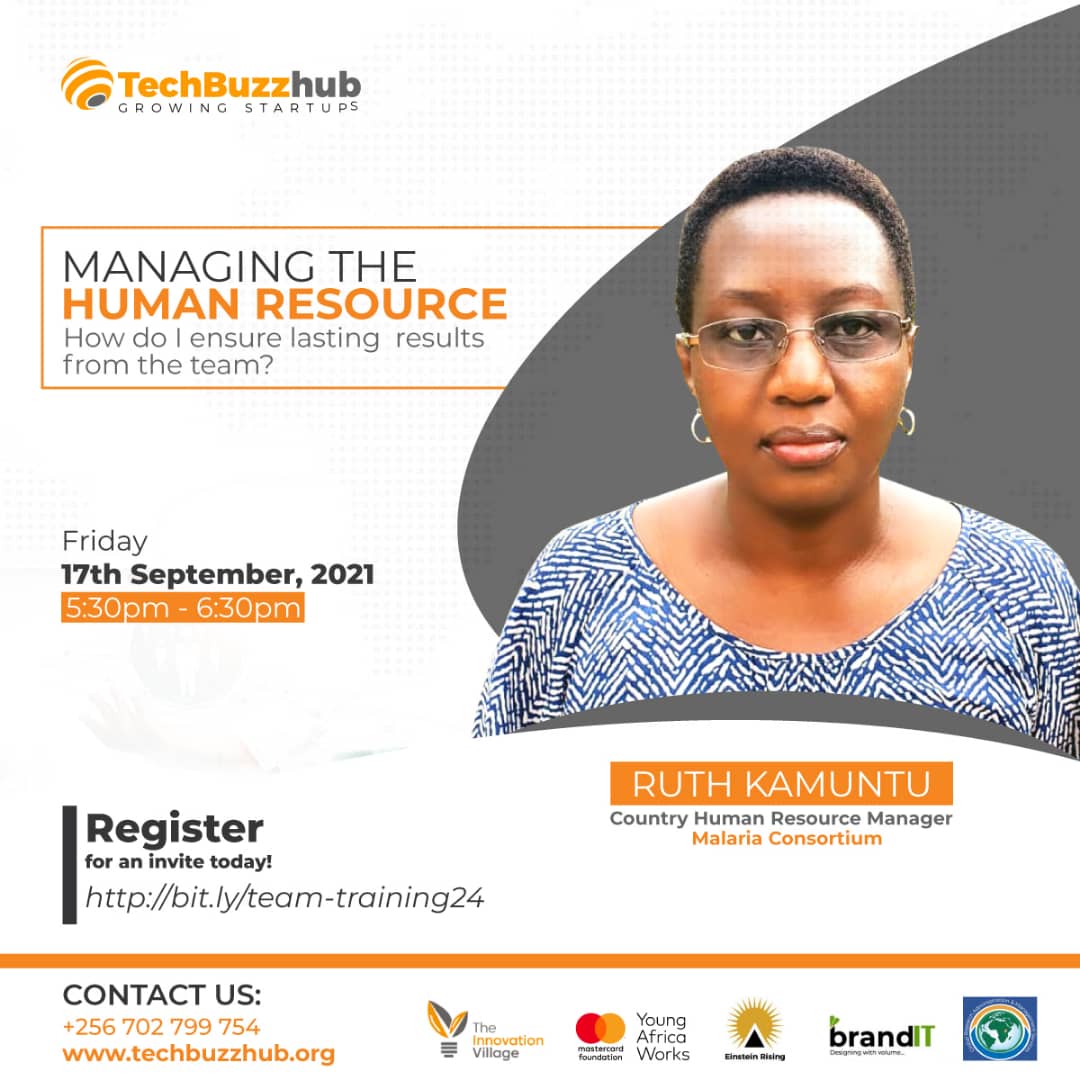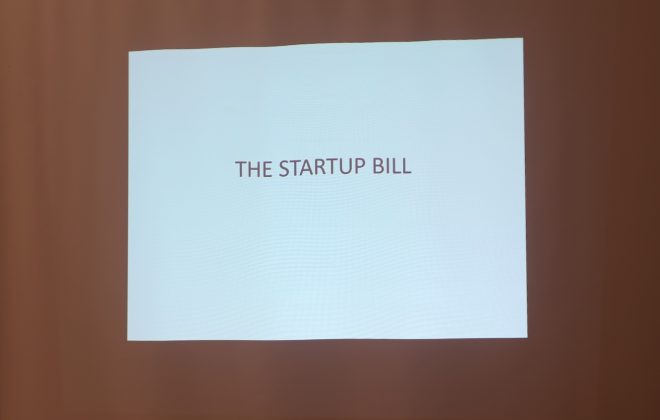FINDING A CO-FOUNDER’S
How can I find the right partner for my business?
We start a new series of webinars with a new theme “team training” that is actually going to move forward from ideas, now we expect you to have a business and seen it start, however we believe you need someone to move your business forward with. From our very first webinar by KENETH our team lead, we move on to this very theme in exploring the fact of how do you find a new business partner, taking us through this is MR. OWNIY MICHEAL, an advocate with KAGANZI AND COMPANY ADVOCATES, DIRECTOR AND FOUNDER AT OWEN SAFARIS LTD, …… brings on board his experience, right from primary school level. What? Why? and when you need a co -founder, with an intention to open up your mind.
“My first business started in primary level at around 9, I was selling mangoes. In the very many other businesses that I have been a part of some of which I hunted for co-founder where as others people hunted for me” he says.
Who is a co-founder?
Somebody you start a business with. A lot of people in Uganda have a problem starting a business with another, due to ever ego, or prior experiences. For example, Xiamen company CEO who went out in searching for specific people he needed in his business. A kind of people who would individually qualify for a CEO position on their own. When he got them up together, his business registered a tremendous growth in a few years of start. Another example is Steve Jobs and his other partner prognier for apple. I will still refer to the greatest start up that has ever existed, a family. It usually takes a while to find someone to get married to
Why would you want a partner?
From experience we had a really hard time in the beginning, we had to wear very many hearts that included working for about 12hrs a day, among very many other responsibilities. Some people will tell you they don’t need a business when they have just started. May be right or wrong.
You need to distribute stress. You find someone who can take some part of the work load off your shoulders. It really means a lot. You either find someone you bare the stress alone.
To avoid business zombie. When you are alone you may find your business remaining stagnant at one level and at the 10th year, you still are earning as you were at the 2nd year. Many of these fail. If you work with another person in times of losses, a partner can always push you to newer ideas of how best the business can be pushed ahead.
Mitigating risks. It becomes easier to mitigate risks when you are two people running the company yet when you were alone it rather hard as the saying goes, two heads are better than one. You will be more trusted if you have people with more experience and expertise. Therefore, you can always find a way out of the corner your business is pushed to. Someone will be more willing to work with you if you have many or a few people who have worked in the business given the fact that you are a startup in the business. This is majorly because of the directors a managers and co-founders in other businesses.
How do I identify a co-founder?
A lot of people give them very names, I want to look at the characteristics of the individual from the a business perspective. Am sure you can recognize many of these around you.
Dreamer. the dreamer is the person who is always thinking about new things they want to think outside the box. He is always thinking about crazy things. They are usually terrible under stress. A sandwich, what if we try peanut butter and jelly, you know it would make a good sandwich, originally there was butter and originally there was jelly, combined together is a sandwich.
Analyst. Someone who is always interested in the facts in the numbers. They get everything to turn into facts and figures and gets the rest to understand how best the business can operate. If you were to start a sandwich shop, he would task himself to get everything into facts and figures. Like what percentage of the market are we targeting, How many people would we have to sell the sandwich to in order to make profit?
Persuader. The person who will get you to accept or do something even when you don’t need it.
Manger. He is one who gets all the work under control. He is a target oriented type, He is the nagging type, that always gets to find out whether the job is done, what deadline is up and what has been accomplished. He
Depending on the kind of business, you may need one, two, three, or all the four of these kind of people. If you have two creative people, they will always have great ideas but never get things done. But if you have a manger and a creative person, he can turn this creative idealist to achieve it in actuality.
Then there comes a persuasive person. He comes in to convince the market that they really need that product that has been introduced in the market. So you need other people who can do these specialties and these can help you in your business growth. Some individuals have all the four characters’ others don’t. we must learn to accept our short comings and find some other person to complement your strength and your weaknesses. That’s why you need a co-founder.
So you have a vision you may be the dreamer, you will need a persuader, you tell him your vision so that he can sell the idea to the investment club, the bank or prospecting investor, so that it gets him and you the money to materialize your vision.
Weaknesses of the different characters?
The problem with the dreamer is if they don’t have something to dream about, they become lazy, so you have to keep them inspired to dream about good ideas then they will be functional.
The analysts over analyze things, they are the kind that will always shoot down ideas, for probably the right reasons. May be they try to tell you how best you can improve your idea in order to make it better.
The manager, where the manager finds everything running smoothly, they start becoming despots and soon or later they start dictating ad imposing ideas even without enough supporting data. Which is why all the other parties are necessary.
You may not need to hire them all at the same time, but rather hire a few later and start with the most important ones earlier depending on your business.
The legal aspect then comes next.
Keeping in mind that 80% of business that start may not see their birth, and only 20% succeed, it is very evidential that in most of the business there are both challenges as much as there are opportunities. Many businesses have a number of challenges. A solopreneur has as much risks as they are for him to succeed compared to a company, with many shareholders. This is because it all starts and ends with him, however with a company the risks are shared. This takes us to the risk factor; The risk analysis.so usually you try to work around the clock to mitigate what, why and how best you can make your company succeed. With many companies there are a lot of disagreement about the model of operation. when you are a group, many members of the group may fail to agree on the best way to run the company. The earlier you foresee this, the better you stand a chance to save your future hustles in the case of a company.
Some of the document that help a business owner to manage and mitigate these internal mis-understandings in the company, like the memorandum of association, articles of associations of the company, constitution of the investment clubs, are they enough, not necessarily.
A shareholders document helps regulate the powers of the shareholders in decision making and operating procedures, this document simply supplements the memorandum of association or the articles of association, you can even create an equivalent for a partnership.
When it comes to a higher level decision making you can create a board charter which regulates how directors can proceed in resolving misunderstanding and disagreements at that level.
How do you handle disagreement s that come up usually among partners especially later in the growth of the partnership?
Most of these disagreements come in as a result of money, however you can manage it by including in the clause in the partnership agreement, that no decision can be made without a unanimous opinion from the rest of the partnerships. Form the word start, when this is done, the rate of disagreements significantly reduces.
Is the next of kind of the partner, in case of demise, part-net to the same benefits that demised partner had before death or incapacitation to continuing carrying out their responsibilities? Or do you just continue with your startup and find another partner.
It depends on the form of business you have taken, when it comes to partnerships, your partnership deed tells you the interest of the person can pass on to the relative of the partners. But for a company its different. When a shareholder transmits his shares to the next of kin, or to a legal representative, then they would have an interest in the company but that depends on whether the board of directors registers the shares to the next of kin of the person who died. Again you need to look at your partnership deed.
How would you advise the entrepreneurs who are not equipped as you, in terms of drawing up the documents? How easy can they go about it?
A lot of these documents are on the internet, and they can be downloaded from the net, however the costs of doing business should be put on line. The lawyers may be very expensive but it would be worth it. When it comes to professional work, they are expensive but it’s worth it.
The list of professionals you need to keep in check and always pay a good some of money, for your protection are lawyers, accountants, tax person, a banker and an insurance person. These costs can be passed on from your business to your clients. Please get professional help it may cost you but it will help in a long run.
What are the headoffs between the kid of business you would want to perform?
It depends on the form of business you want. A sole proprietorship easy to start but very complicated to run it. In case the company gets a problem it is not the company that caters for the losses but you do.
A limited company, it is very complicated to start and run. It is an artificial person, you the owner only owns shares in the company, it has a high cost of running business. It is usually limited to 100people. More than that it becomes a cooperative.
The cooperative, has more than 100 people and usually listed in the stock exchange.
In your experience would you advise a co-founder to have a separate counsel to seek advice from? Does it have any legal implication.?
Yes, it’s good for one who enters a partnership to enter into the partnership with a lawyer to take care of the interests of that particular partners.
What are the necessities of legal business registration?
Briefly, these include;
Finding names which you want to operate the company on, the name is reserved, the objectives of the company, the people you want as directors, shareholders and then you go to the lawyer to help you get and draft the documents which include the memorandum and articles of association, the list of directors and secretaries of the company, the nominal value that is how much the company can offer to the shares, and other documents , which will need to be signed by the representative of the bod, and the shareholders then it can be incorporated and thus registered with URSB. And the company can start, after it starts you need to get a tin number for the company and the directors, from URA, the company address, prepare resolution for opening a bank account, a trading license and allocation where you are going to operate from.
Which steps do you need to consider when joining a business with a partner who has experience.
First do due diligence with the company, then get an account to get you the exact value of the business. If those are taken care of then you can go ahead and request for the partnership deed to sign a new deed.
Would you advise someone to have a one-man company, or remain in the sole proprietorship? What are the advantages.?
Which one is better? honestly it depends on the circumstances. Having a normal company instead of a single member company would be my choice. You can change your company from a business name to a sole company. The question, is do you want to have co-founders or you want to be the only founder in the company?
When looking for partners in my company do I need professionals in the start or I can just hire then at a time I need?
It depends on what exactly your business needs.
Until next time please we remain TechBuzz hub and continue checking out the new blogs that shall be unfolding.






